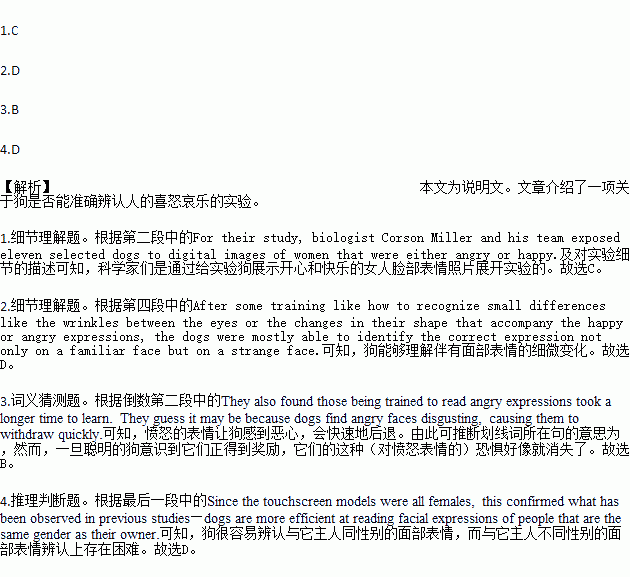题目内容
While dog keepers realize their dogs can read their moods accurately,scientists have always been a little doubtful.Now thanks to some researchers at the University of Veterinary Medicine in Vienna,Austria,we finally have some convincing evidence.
For their study,biologist Corson Miller and his team exposed eleven selected dogs to digital images of women that were either angry or happy.Half the dogs were rewarded for touching the screen when shown a happy face,while the other half got their treat for selecting those that appeared angry.
Interestingly,the dogs were not provided with the entire face.Some dogs were shown only upper halves while the others observed lower halves.That’s because the scientists believe humans show their emotions on their entire face.
After some training like how to recognize small differences like the wrinkles between the eyes or the changes in their shape that accompany the happy or angry expressions,the dogs were mostly able to identify the correct expression not only on a familiar face but on a strange face.The researchers concluded the dogs were smart enough to read human emotions.
They also found those being trained to read angry expressions took a longer time to learn.They guess it may be because dogs find angry faces disgusting,causing them to withdraw quickly.However,once the smart dogs realized they were getting rewarded,the trepidation seemed to disappear.In fact,the dogs had such a good time playing the computer "game" that scientists had a hard time keeping them away from the touch screens after the study was completed.
The researchers also noticed only dogs with a male owner had a harder time understanding the expressions correctl. Since the touchscreen models were all females, this confirmed what has been observed in previous studies-dogs are more efficient at reading facial expressions of people that are the same gender as their owner.
1.How did the scientists conduct the experiment?
A. By mixing the selected dogs together.
B. By leaving dogs to women who are either happy or angry.
C. By showing digital pictures of women’s happy or angry faces.
D. By rewarding only half of the dogs touching the screen.
2.Which of the following statements is TRUE about the dogs in the study?
A. The dogs were not all provided with the entire face.
B. The dogs couldn’t read strangers facial emotions.
C. According to their size,the dogs were given either upper or lower halves.
D. The dogs could make out small changes accompanying facial expressions.
3.The underlined word "trepidation" in Paragraph 5 probably means _________ .
A. curiosity B. horror
C. excitement D. doubt
4.How might the results change if the dogs with female owners are shown pictures of male faces?
A. They would be scared away at the sight of the pictures.
B. They found it easy to tell the emotions on the entire face.
C. They could only tell emotions on partial faces rather than on entire faces.
D. They found it hard to tell the moods on the faces of a different gender.


 ogy Sydney, made From Sydney With Love about two Indian students falling in love with some of the 8. (building) of Sydney University. By 2014, the number of Indian students in Australia was rising again.
ogy Sydney, made From Sydney With Love about two Indian students falling in love with some of the 8. (building) of Sydney University. By 2014, the number of Indian students in Australia was rising again.